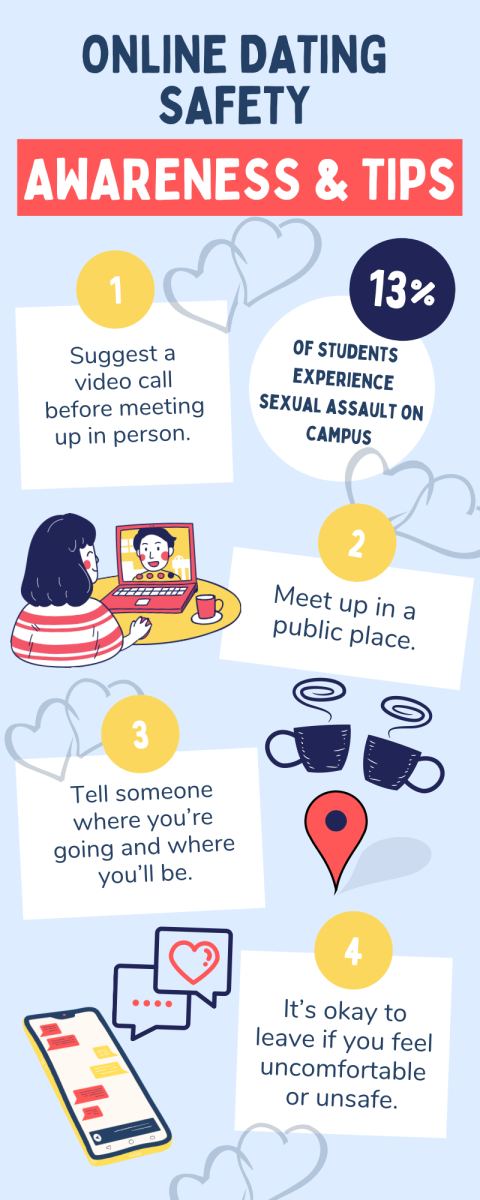Editors note: This article contains language regarding sexual assault.
During their time in college, 13% of undergraduate and graduate students experience sexual assault on campus, according to the Rape, Abuse & Incest National Network.
RAINN is an anti-sexual violence organization that was founded in 1994. RAINN has established programs throughout the U.S. in order to prevent sexual violence and help survivors.
The organization is the creator and operator of the National Sexual Assault Hotline and the Safe Helpline for the Department of Defense.
RAINN offers resources for awareness related to preventing sexual violence and how to support loved ones who are victims of sexual violence. The RAINN website also has a section for searching which laws related to consent and sexual violence are implemented in a specific state.
“Some places to start when you are online dating is to keep an eye out for people or a match who may be trying to request financial assistance or other personal information right away,” said Erinn Robinson, director of media relations for RAINN.
Robinson said to also watch out for people who might be trying to take the conversation off the dating platform right away.
“One thing to think about is that until you’re comfortable with somebody, you know, it’s really beneficial to keep those conversations on the platform that way if the conversation becomes uncomfortable, it occurred on the platform and that makes it easier for you to repeat or report,” she said.
Taking a conversation off of the original dating platform can make the reporting process more difficult.
Robinson said other red flags might be requesting money, harassment, threats and offensive language.
“You also want to be careful of like catfish or fraud profiles,” Robinson said. “Do they have an actual photo in their avatar? Does their account or their page like have their updated information on it? Does it look like it’s actually a human that’s monitoring and interacting through that page?”
Robinson said some profiles are used to scam people into assisting them financially and even claim to be from the U.S. but may actually be living and working in a foreign country.
“Something else to watch out for on a catfish profile claiming to be recently widowed with children disappearing from the site and then reappearing under a different name and then giving vague answers to specific questions, somebody who’s maybe over complimentary or just over the top romantic too early in communication,” Robinson said.
She said to watch for fake profiles that have no biography, no links and social media with only one photo posted.
Robinson said when matching with someone and sharing photos, a live or motion photo can pass geolocation metadata with the image.
According to Apple, geolocation metadata is embedded in each photo and video taken on a phone and it is possible for others to view the metadata showing where the photo or video was taken.
“You can use different photos across your different dating profiles. It’s easy to do a reverse image search with Google,” Robinson said. “So if your dating profile has a photo that is also on like your Instagram or your Facebook, it’ll be easier for a match that you might not be ready to connect with to find you on other social media platforms.”
One of the safety tips RAINN suggests for meeting with possible matches from an online dating platform is to video call the person before an in-person meeting.
She said if a match is resistant to video calling, it is a possible sign the person may not be who they say they are. While the video call can help assure the person is who they say they are, it is also a good way of making sure both parties are comfortable before meeting in person.
“Once you chatted and you feel comfortable, you are ready to meet in person,” Robinson said. “You always want to let a trusted family member or a friend know where you’re going. You could always take a screenshot of your matches profile and send that to them.”
According to RAINN, meeting in person in a public place is a good way to make sure both parties are comfortable and feel more secure.
“The big takeaway here and making the transition from online to in-person dating, is your safety is more important than being polite and if you feel uncomfortable or unsafe at any time it is okay to get up and leave,” Robinson said.
Robinson said to leave an uncomfortable situation, enlisting the help of nearby security or asking the bartender for an “angel shot.”
According to TIPS, an angel shot is a discreet way of asking a bartender for assistance if a customer is in an unsafe or uncomfortable situation.
“We do say safer because no sexual violence safety tip is ever like a hundred percent promise of safety,” Robinson said. “And so it’s really important that any conversation about dating safety or safer online dating begin by acknowledging that the only person responsible for sexual violence or sexual assault is a perpetrator.”
She said the hope of safer dating tips is useful guidance on these interactions across digital dating platforms as predators and perpetrators can use them for sexual harassment and violence.
App State Police offers a free Rape Aggression Defense self-defense class for women and men, which covers a four-week period.
Wellness and Prevention Services offers a Red Flag Active Bystander Training, which is provided by the Red Flag Campaign. The training prepares participants to be active bystanders in which they report or confront a situation they feel exhibits red flags.



